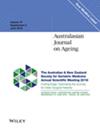Exploring care staff perspectives of malnutrition in residential aged care
Abstract
Objective
This study aimed to explore the understanding of care staff in Residential Aged Care (RAC) regarding malnutrition and their perspectives on the multideterminant factors associated with providing nutrition care to residents.
Methods
A qualitative study was conducted, utilising the socioecological model as a framework. Focus groups were conducted with current RAC care staff and were recruited via convenience sampling. Three focus groups were conducted using semi-structured questions.
Results
Fifteen RAC care staff (n = 13 female participants) with a range of career experience participated in focus groups (five participants per focus group). Two main themes and five subthemes were identified. Theme 1: lack of understanding of malnutrition, with subthemes of: 1.1: there are no residents with malnutrition in my facility, 1.2: gaining weight is more of a concern than weight loss (associated with malnutrition), and Theme 2: feeling restrained in doing more, with subthemes of: 2.1: limited time and lack of staff impact the care I can provide, 2.2: residents with malnutrition have greater care needs, and 2.3: lack of social support contributes to malnutrition.
Conclusions
The study explored malnutrition issues in RACs from care staff perspectives. Care staff expressed genuine care for residents, yet felt they lacked capacity to provide adequate support, particularly for those with malnutrition. Staff shortages, inadequate training, and time constraints affected their ability to attend to resident needs. The study identified systematic issues, particularly at the policy level, in malnutrition management, providing a clear focus for improvement and future research.

 求助内容:
求助内容: 应助结果提醒方式:
应助结果提醒方式:


